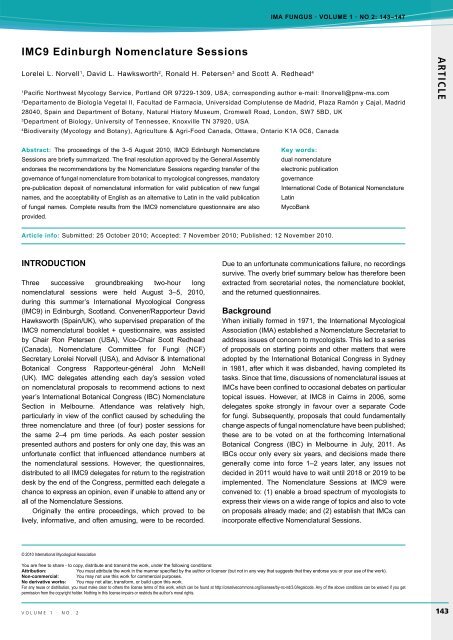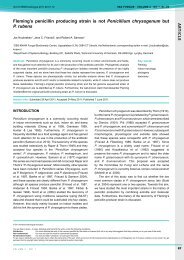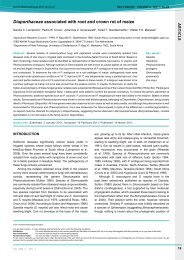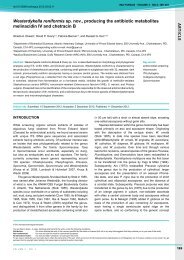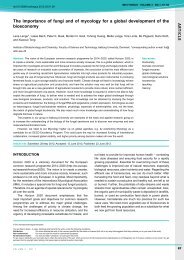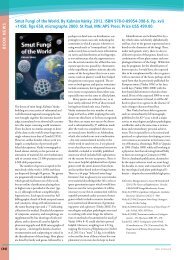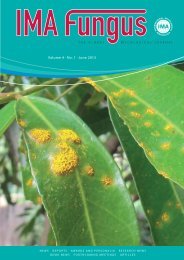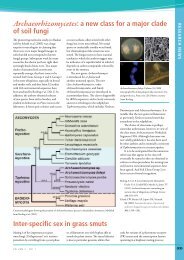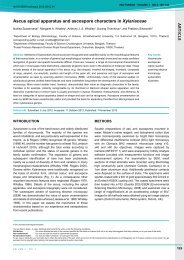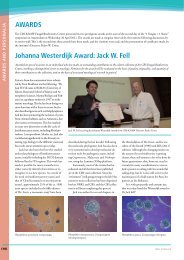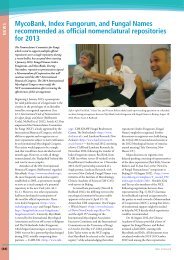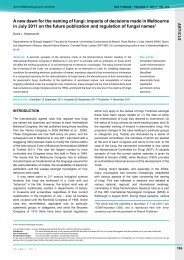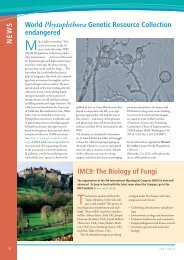Volume 1 · No. 2 · December 2010 V o lu m e 1 · N o ... - IMA Fungus
Volume 1 · No. 2 · December 2010 V o lu m e 1 · N o ... - IMA Fungus
Volume 1 · No. 2 · December 2010 V o lu m e 1 · N o ... - IMA Fungus
Create successful ePaper yourself
Turn your PDF publications into a flip-book with our unique Google optimized e-Paper software.
<strong>IMA</strong> <strong>Fungus</strong> · vo<strong>lu</strong>me 1 · no 2: 143–147<br />
IMC9 Edinburgh <strong>No</strong>menclature Sessions<br />
Lorelei L. <strong>No</strong>rvell 1 , David L. Hawksworth 2 , Ronald H. Petersen 3 and Scott A. Redhead 4<br />
1<br />
Pacific <strong>No</strong>rthwest Mycology Service, Portland OR 97229-1309, USA; corresponding author e-mail: llnorvell@pnw-ms.com<br />
2<br />
Departamento de Biología Vegetal II, Facultad de Farmacia, Universidad Comp<strong>lu</strong>tense de Madrid, Plaza Ramón y Cajal, Madrid<br />
28040, Spain and Department of Botany, Natural History Museum, Cromwell Road, London, SW7 5BD, UK<br />
3<br />
Department of Biology, University of Tennessee, Knoxville TN 37920, USA<br />
4<br />
Biodiversity (Mycology and Botany), Agriculture & Agri-Food Canada, Ottawa, Ontario K1A 0C6, Canada<br />
ARTICLE<br />
Abstract: The proceedings of the 3–5 August <strong>2010</strong>, IMC9 Edinburgh <strong>No</strong>menclature<br />
Sessions are briefly summarized. The final reso<strong>lu</strong>tion approved by the General Assembly<br />
endorses the recommendations by the <strong>No</strong>menclature Sessions regarding transfer of the<br />
governance of fungal nomenclature from botanical to mycological congresses, mandatory<br />
pre-publication deposit of nomenclatural information for valid publication of new fungal<br />
names, and the acceptability of English as an alternative to Latin in the valid publication<br />
of fungal names. Complete results from the IMC9 nomenclature questionnaire are also<br />
provided.<br />
Key words:<br />
dual nomenclature<br />
electronic publication<br />
governance<br />
International Code of Botanical <strong>No</strong>menclature<br />
Latin<br />
MycoBank<br />
Article info: Submitted: 25 October <strong>2010</strong>; Accepted: 7 <strong>No</strong>vember <strong>2010</strong>; Published: 12 <strong>No</strong>vember <strong>2010</strong>.<br />
Introduction<br />
Three successive groundbreaking two-hour long<br />
nomenclatural sessions were held August 3–5, <strong>2010</strong>,<br />
during this summer’s International Mycological Congress<br />
(IMC9) in Edinburgh, Scotland. Convener/Rapporteur David<br />
Hawksworth (Spain/UK), who supervised preparation of the<br />
IMC9 nomenclatural booklet + questionnaire, was assisted<br />
by Chair Ron Petersen (USA), Vice-Chair Scott Redhead<br />
(Canada), <strong>No</strong>menclature Committee for Fungi (NCF)<br />
Secretary Lorelei <strong>No</strong>rvell (USA), and Advisor & International<br />
Botanical Congress Rapporteur-général John McNeill<br />
(UK). IMC delegates attending each day’s session voted<br />
on nomenclatural proposals to recommend actions to next<br />
year’s International Botanical Congress (IBC) <strong>No</strong>menclature<br />
Section in Melbourne. Attendance was relatively high,<br />
particularly in view of the conflict caused by scheduling the<br />
three nomenclature and three (of four) poster sessions for<br />
the same 2–4 pm time periods. As each poster session<br />
presented authors and posters for only one day, this was an<br />
unfortunate conflict that inf<strong>lu</strong>enced attendance numbers at<br />
the nomenclatural sessions. However, the questionnaires,<br />
distributed to all IMC9 delegates for return to the registration<br />
desk by the end of the Congress, permitted each delegate a<br />
chance to express an opinion, even if unable to attend any or<br />
all of the <strong>No</strong>menclature Sessions.<br />
Originally the entire proceedings, which proved to be<br />
lively, informative, and often amusing, were to be recorded.<br />
Due to an unfortunate communications fai<strong>lu</strong>re, no recordings<br />
survive. The overly brief summary below has therefore been<br />
extracted from secretarial notes, the nomenclature booklet,<br />
and the returned questionnaires.<br />
Background<br />
When initially formed in 1971, the International Mycological<br />
Association (<strong>IMA</strong>) established a <strong>No</strong>menclature Secretariat to<br />
address issues of concern to mycologists. This led to a series<br />
of proposals on starting points and other matters that were<br />
adopted by the International Botanical Congress in Sydney<br />
in 1981, after which it was disbanded, having completed its<br />
tasks. Since that time, discussions of nomenclatural issues at<br />
IMCs have been confined to occasional debates on particular<br />
topical issues. However, at IMC8 in Cairns in 2006, some<br />
delegates spoke strongly in favour over a separate Code<br />
for fungi. Subsequently, proposals that could fundamentally<br />
change aspects of fungal nomenclature have been published;<br />
these are to be voted on at the forthcoming International<br />
Botanical Congress (IBC) in Melbourne in July, 2011. As<br />
IBCs occur only every six years, and decisions made there<br />
generally come into force 1–2 years later, any issues not<br />
decided in 2011 would have to wait until 2018 or 2019 to be<br />
implemented. The <strong>No</strong>menclature Sessions at IMC9 were<br />
convened to: (1) enable a broad spectrum of mycologists to<br />
express their views on a wide range of topics and also to vote<br />
on proposals already made; and (2) establish that IMCs can<br />
incorporate effective <strong>No</strong>menclatural Sessions.<br />
© <strong>2010</strong> International Mycological Association<br />
You are free to share - to copy, distribute and transmit the work, under the following conditions:<br />
Attribution:<br />
You must attribute the work in the manner specified by the author or licensor (but not in any way that suggests that they endorse you or your use of the work).<br />
<strong>No</strong>n-commercial: You may not use this work for commercial purposes.<br />
<strong>No</strong> derivative works: You may not alter, transform, or build upon this work.<br />
For any reuse or distribution, you must make clear to others the license terms of this work, which can be found at http://creativecommons.org/licenses/by-nc-nd/3.0/legalcode. Any of the above conditions can be waived if you get<br />
permission from the copyright holder. <strong>No</strong>thing in this license impairs or restricts the author’s moral rights.<br />
v o l u m e 1 · n o . 2 <br />
143


